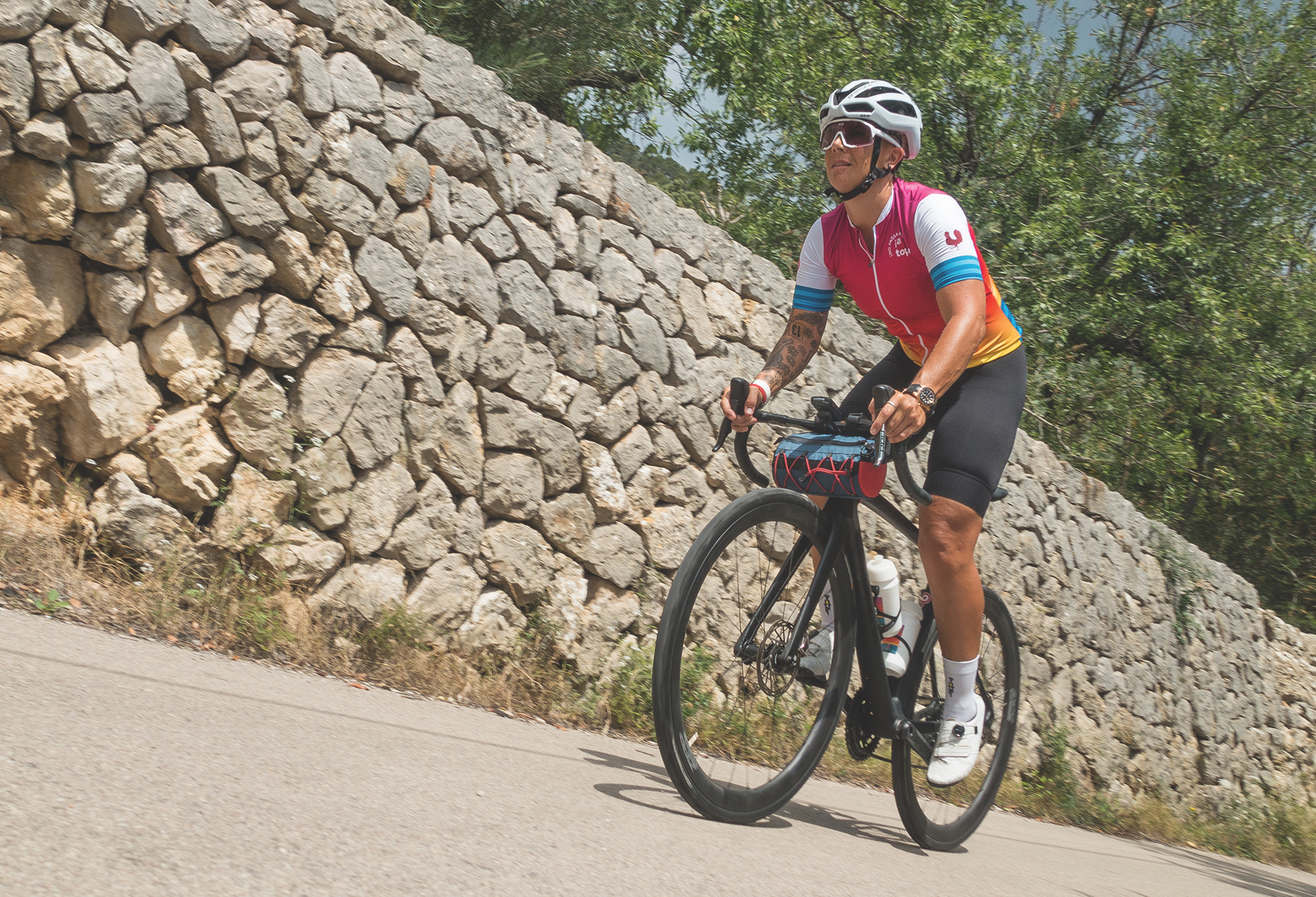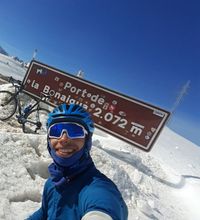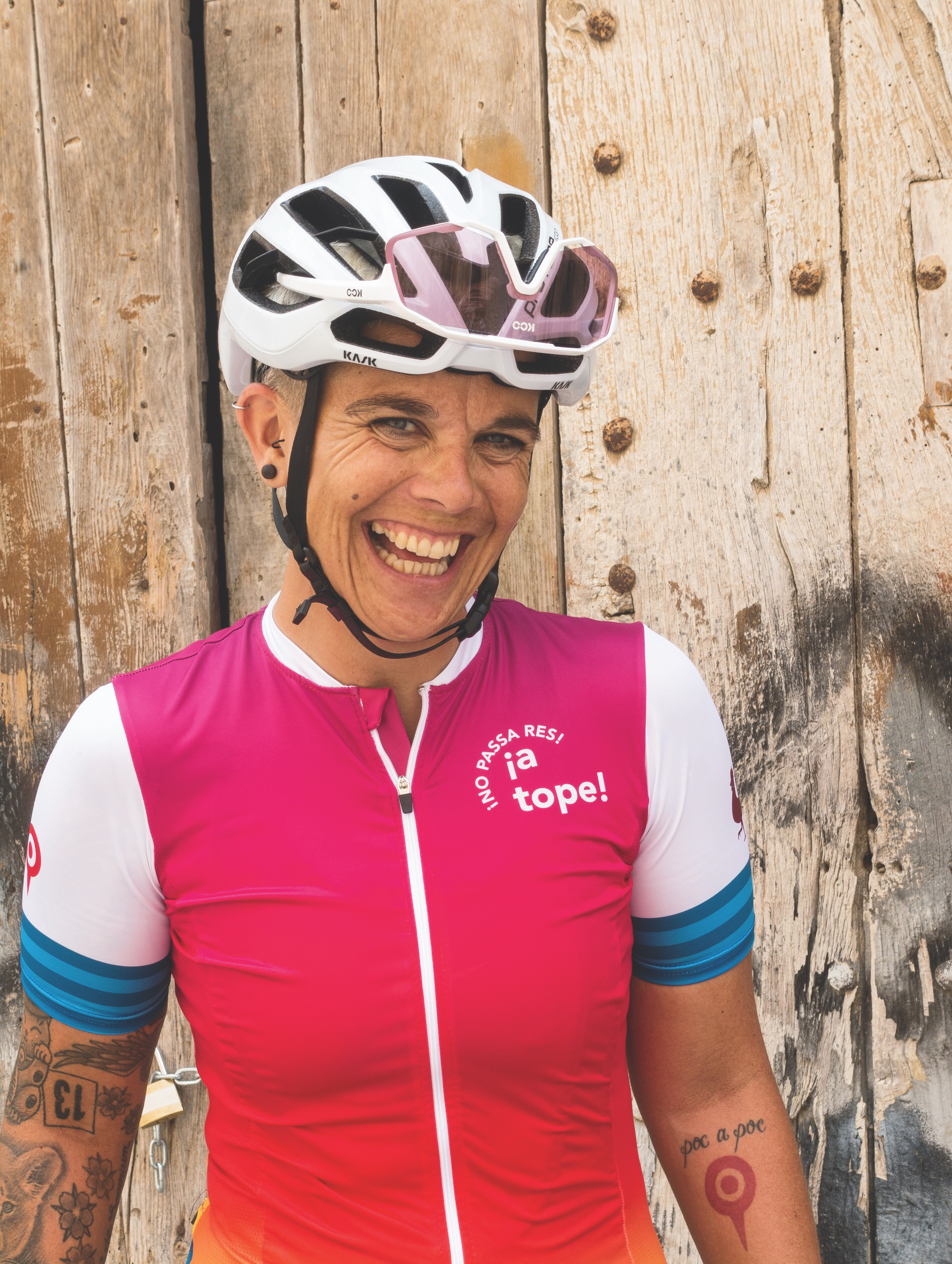'One transplant, two cancer surgeries – I get knocked down but I get up again': The champion rider with next-level resilience
Facing repeated risks to her life from kidney failure, Ottilie Quince is determined to keep bouncing back – on and off her bike


This article was originally published in Cycling Weekly's print edition as part of the long-running MY FITNESS CHALLENGE series.
There are times while listening to Ottilie Quince’s story that it seems just too surreal to be true. It’s as if the world has conspired against her for most of her adult life. “Sometimes when I tell people my story, they say, ‘It sounds like made-up bulls**t’,” she says, “but I promise you it isn’t.”
The lively, fast-speaking and outgoing 41-year-old would not be alive today were it not for her mother’s donated kidney, transplanted 17 years ago. Then again, that very same transplanted organ has twice almost killed her after the cocktail of medication required daily provoked cancerous growths. On both occasions, Quince has survived – but cancer could come again at any time.
Throughout it all, she has become an 11-time world, eight-time European and 18-time British transplant cycling champion, while also running her own bike shop, guiding business and physiotherapy clinic in her adopted home of Majorca, Spain. As she recounts every dramatic twist, turn and sucker-punch to me, she does so with striking exuberance. “I feel like I was made to deal with all of this s**t,” she says. “I’m happy it’s all happened. It’s changed my life, but I’m resilient.”
The youngest of four siblings, and the only girl, Quince was born in Luton in 1982. “My parents always wanted a girl to dress in pink but I wanted to be one of the boys. Football was how I was dragged up.” As a schoolkid, Quince played in the boys’ football teams, and then beansrepresented Luton Town Ladies for four years. “If women’s football had been as developed then as it is now, I think I could have gone quite far.” Between 2007 and 2010, she was also the Luton men’s team’s physio. “I was Luton obsessed. It was my home, my life,” she says.
In December 2006, Quince, 24 at the time, went to the doctor’s for a six-month contraceptive pill check-up. When the doctor took her blood pressure, “the reading was ridiculous – 220 over 100.” Normal is anything below 120/80mmHg, and follow-up tests were ordered. Soon after, while teaching PE in the same sixth-form college she herself had attended, Quince got the bikeresults. “Stage five out of five chronic kidney failure. Reflux nephropathy was the proper term, meaning my kidneys were damaged by the backward flow of urine into the kidney. They also told me I had 12% kidney function, and that I had been born with a maximum of 20%. I’d no idea that I had been symptomatic [see boxout]. They told me I had three choices: death within half a year, dialysis within six months, or a kidney transplant.” There was more heartbreaking news: “I was told I’d never play football again.”
Quince immediately began the search for a kidney donor, but ran into a roadblock straight away. “My uncle, Andrew, had kidney failure in 1986 and my dad, Martin, was his donor. It meant my dad couldn’t give another one away and he was devastated.” The search through the rest of her family began. “My oldest brother Benedict was in the A-positive blood group, whereas I’m O-positive, and then scans revealed that my youngest brother Maxwell was born with only one kidney. We were learning that our family had a history of kidney problems.” Quince’s other brother, Elliott, realised that he might need to donate a kidney to future offspring – which just left their mum.
The latest race content, interviews, features, reviews and expert buying guides, direct to your inbox!
Lesley, Quince’s mother, was approved as her donor, and eight months of rigorous tests later, the transplant finally took place. “By this point I had gone downhill drastically. My kidney was functioning at 9%, and I should have been on dialysis but I was too stubborn.” Quince was operated on in the nick of time, and she gradually returned to her teaching and physio jobs. Nine months on, however, having become accustomed to her daily medication – 46 drugs initially, including antibiotics, steroids and immunosuppressants every day – her own kidney, the remaining one, had to be removed because it was affecting the function of the transplanted kidney. “So I was down to one kidney.”
Olympic inspiration
Quince married in 2008, and for a wedding present, she asked for a road bike, as she could no longer play football. “I had been inspired by watching the track events at the Beijing Olympics.” In 2009, she started riding for CC Luton, and raced a few omnium events on the track. In 2010 she competed at the British Transplant Games in Bath.
“I could play football for 90 minutes but I had no idea how hard to push, or what I was meant to feel on the bike,” she laughs. “But I won my age group. Cool, I thought, but I want to win overall. I thought that if I trained hard enough, I could be the fastest in the time trial and road races. I knew it was possible. I qualified for the World Transplant Games in Sweden in 2011 and I won in both events. I was a double world 57champion.” She had found a new sport to thrive in – but bad news was lurking round the corner.
When someone receives a donated organ, they have to take immunosuppressants to suppress the immune system which would otherwise attack and reject the foreign organ. A necessary consequence is the downregulation of the immune system, making it less efficient at detecting and destroying cancer cells. “I went to the doctor’s [in September 2012] because the area around my kidney felt numb and they spotted a four-centimetre cancer tumour on the superficial surface of the donated kidney.” In August 2013, the tumour was removed – Quince’s third surgery in the same area.
Less than two years later, she was back in hospital. “I’d flown to Majorca in March 2015 for a training camp and I crashed hard on the Puig Major, but thankfully avoided any broken bones.” It was an A&E visit that changed her life. “I realised how good the Spanish hospitals were, and it helped nurture a seed already planted in my mind: I would move to Majorca.” A few months afterwards, she settled in Port de Pollença, the most northerly town in Majorca, and opened her business, OQ Service Course, in February 2017. “I thought I’d never leave Luton, but now I feel more Mallorquín and Spanish.”
Mostly funding herself, supplemented by the occasional sponsorship deal, Quince continued to compete, and won every time she raced a British, European or World Transplant Championships road race or time trial. “I’m undefeated in 37 races,” she points out. “The 2016 European Games were held in Finland, and they emailed me three weeks before saying that I had to change sports, as the women’s race was cancelled due to a lack of entrants. I asked if I could race the men.” Organisers agreed, and Quince finished 12th – just two seconds behind the winner. “Not bad for the only girl,” she grins. “If I hadn’t shown up, there might never have been a women’s road race again.”

Ottilie Quince is still smiling and living life to the full despite a succession of serious medical issues
Four more world titles followed and all was going well – until it wasn’t. “I was watching the Ineos boys doing two-up TTs outside my house [in December 2019], when I had this overwhelming urge to urinate. Then, a few days later, I collapsed in the pharmacy. I had an MRI scan and it showed a 5.5cm cancerous tumour deep inside the transplanted kidney.” It was a complicated case for doctors, not least because the kidney had already been operated on. “The doctors in Majorca couldn’t believe I’d already had cancer on the transplanted kidney. I had to show them photos of the operation.” She too was in shock. “Yet again cancer. Yet again I was fighting for my life.”
Local hospitals could not find a surgeon willing to operate, so Quince took matters into her own hands. “In August 2020, at the height of Covid, I flew to the UK to meet a surgeon, and three months later I had open cancer surgery again. I joke that I have a zip on my scar.”
Three years on, Quince is happy, healthy, and still winning bike races. As the lead guide at her business, she is well-versed in telling her story to visiting cyclists, punctuating each turn with a laugh. But she lives with a constant awareness of the bad fortune that has followed her and which may not have exhausted itself just yet. “I have to keep taking the medication as it keeps me alive, but those drugs have caused the cancer both times, and it could come back tomorrow.” How do others respond to her story? “People say I have to be grateful, but that sounds as if I’ve been let off for something I did wrong. I was born with this. I am thankful, not grateful – thankful that I was so fit and strong that I didn’t realise I had kidney failure until I was 24. And thankful it happened to me, not any of my brothers. I get knocked down, but I get up again.”
Coach's view: ‘She's fearless and tactically brilliant!'
Rich Smith (ridefastcoaching.com) first spotted Ottilie Quince at the 2010 British Transplant Games. “I could see she had this natural sporting ability, and the massive personality needed to raise the profile of transplant sport,” he says. Ever since then, Smith has been Quince’s coach. “She is the easiest athlete in the world to train because she’s so extraordinarily focused, very determined, delivers on everything, is utterly fearless, and is technically and tactically a very good bike rider. She holds her own against men. She’s a phenomenon.”
Smith, a liver transplant recipient, explains that kidney transplant athletes are as capable as non-transplant athletes: “The power numbers are the same, and the organ swap doesn’t affect performance.” Even so, the medicine regime presents challenges. “Immunosuppressants weaken the immune system, and we thus have to be super careful about infections, and build enough recovery into training.”
How to spot the signs of kidney failure
Chronic kidney disease (CKD) is more common than you might think: 7.2 million Britons have CKD stages one to five, with just under half of those people having the most serious stages of the disease. Stage-five CKD is when the kidney function is less than 15%, and most cases require a kidney transplant – of which 3,000 take place annually.
Each year, around 40,000 people die due to CKD, with black, Asian and minority ethnic communities being more at risk. Characterised by a gradual loss of kidney function, the early symptoms of CKD can be subtle – many remain oblivious until the condition has advanced.
Symptoms include: increased need to pee, blood in the urine, high blood pressure, muscle cramps, swollen ankles, feet or hands due to water retention and, in men, erectile dysfunction.
The full version of this article was published in the 4th January 2024 print edition of Cycling Weekly magazine. Subscribe online and get the magazine delivered to your door every week.

Thank you for reading 20 articles this month* Join now for unlimited access
Enjoy your first month for just £1 / $1 / €1
*Read 5 free articles per month without a subscription

Join now for unlimited access
Try first month for just £1 / $1 / €1
A freelance sports journalist and podcaster, you'll mostly find Chris's byline attached to news scoops, profile interviews and long reads across a variety of different publications. He has been writing regularly for Cycling Weekly since 2013. In 2024 he released a seven-part podcast documentary, Ghost in the Machine, about motor doping in cycling.
Previously a ski, hiking and cycling guide in the Canadian Rockies and Spanish Pyrenees, he almost certainly holds the record for the most number of interviews conducted from snowy mountains. He lives in Valencia, Spain.
